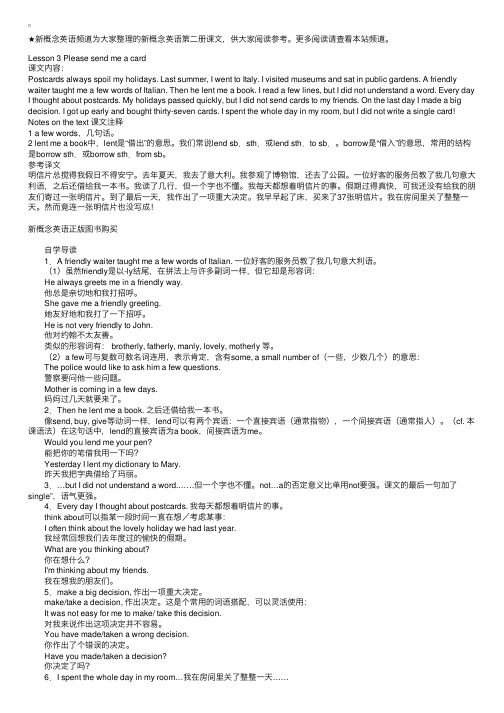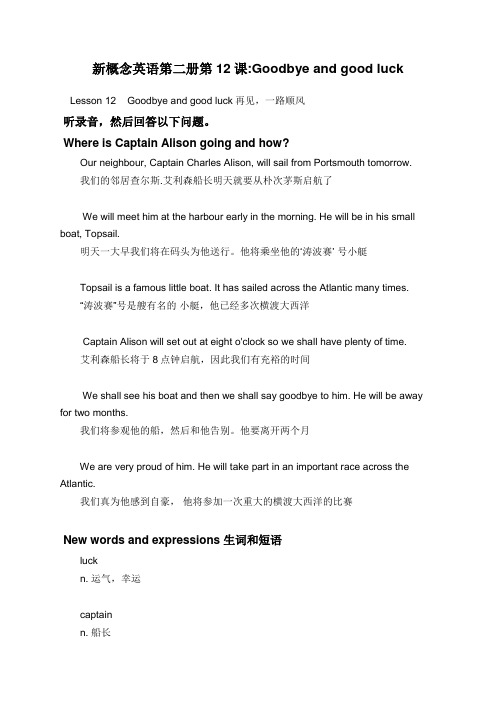新概念英语第二册第12课课文讲解
新概念英语第二册第12课完整ppt课件

• e.g:He will go sailing next week.
• ☺sail from sp.从…起航
• e.g: Tom will sail from New York Harbour
•
early tomorrow morning.
精选ppt
• 2.We’ll meet him at the harbour early
• ☺early in the morning/late in the afternoon
• ☺be in one’s boat乘坐…的船
• e.g:He was in Captain Mike’s boat.
•
☺his small boat和Topsail为同位语
精选ppt
• 3.Topsail is a famous little boat. It has sailed across the Atlantic many times. Captain Alison will set out at 8 o’clock, so we’ll have plenty of time.
• ☺bring sb. luck
• The little stone will bring you good luck.
• ☺lucky(adj.) 幸运的– unlucky(adj.)
•
☺e.g: lucky dog
•
☺luckily(adv.)-unluckily(adv.)
精选ppt
• 2.captain(n.)船长;机长
•
sail across the Atlantic
• She wants to sail around the world 精选ppt
新概念英语第二册课文

★新概念英语频道为⼤家整理的新概念英语第⼆册课⽂,供⼤家阅读参考。
更多阅读请查看本站频道。
Lesson 3 Please send me a card课⽂内容:Postcards always spoil my holidays. Last summer, I went to Italy. I visited museums and sat in public gardens. A friendly waiter taught me a few words of Italian. Then he lent me a book. I read a few lines, but I did not understand a word. Every day I thought about postcards. My holidays passed quickly, but I did not send cards to my friends. On the last day I made a big decision. I got up early and bought thirty-seven cards. I spent the whole day in my room, but I did not write a single card! Notes on the text 课⽂注释1 a few words,⼏句话。
2 lent me a book中,lent是“借出”的意思。
我们常说lend sb.sth.或lend sth.to sb.。
borrow是“借⼊”的意思,常⽤的结构是borrow sth.或borrow sth.from sb。
参考译⽂明信⽚总搅得我假⽇不得安宁。
去年夏天,我去了意⼤利。
我参观了博物馆,还去了公园。
⼀位好客的服务员教了我⼏句意⼤利语,之后还借给我⼀本书。
我读了⼏⾏,但⼀个字也不懂。
新概念英语第二册Lesson10~12课文注释

【导语】新概念英语⼀共144课。
整本书⽆论是语法还是词汇,题材还是语句,都有其出彩之处。
正是因为如此,新概念英语更是经久不衰,深受⼴⼤英语学习者的喜爱。
⽆忧考为您整理了“新概念英语第⼆册Lesson10~12课⽂注释”,希望可以帮助到您!新概念英语第⼆册Lesson10课⽂注释 1 we have an old musical instrument.我家有件古乐器。
instrument常⽤的意思是“器械”、“器具”,尤指医疗、机器等⽅⾯的。
但它可以⽤来泛指各种乐器。
2 It is called a clavichord。
被称做古钢琴。
call在这⾥的意思是“把……称为”、“称呼”,既可⽤于主动语态,也可⽤于被动语态: What do you call this? 你们把这称为什么? They call him big Tom. 他们叫他“⼤个⼦汤姆”。
3 It has belonged to our family for a long time.我们家有这件乐器已经很久了。
belong为不及物动词,因此不能⽤于被动语态。
另外,它是⼀个表⽰状态的动词,⽽不是⾏为动词,所以它也不能⽤于进⾏时。
它最常⽤的时态是⼀般现在时和⼀般过去时: This farm belong to me and it belonged to my father before me. 这个农场现在属于我;在此之前它属于我⽗亲。
4 She struck the keys too hard and two of the strings were broken. 她在击琴键时⽤⼒过猛,损坏了两根琴弦。
并列连词and在这⾥的意义相当于so,表⽰后⼀句是前⼀句的结果。
再如: He fell heavily and broke his arm. 他摔得很重,⼿臂都摔断了。
新概念英语第⼆册Lesson11课⽂注释 1.One good turn deserves another,(标题)礼尚往来。
新概念英语第二册课件Lesson12(共22页)

“为(某人)感到自豪” 表示“参加”、“参与(某项活动 important _______ across the Atlantic.
•
luckily adv.
• ★captain n.船长,机长,连长,领班 陆军上尉,海军上校
• captain+人名,表示“某船长/队长”
• ★.sail [seil]v.航行
He’ll sail from the harbor tomorrow morning. 明天早上他将从港口出发起航 sail for some place
• as proud as a peacock.骄傲如孔雀(极骄傲)
• overproud:过分自负(贬义)专横的 you can be proud, but you can’t be overproud.
你可以骄傲,但不可以自负。
• ★pride n./v. • take pride in sth. 以……为自豪
• ☆say goodbye to sb 告别某人 say hello to:I said hello to him this morning. say hello to问好 say sorry to:You must say sorry to him.
• ☆take part in参加;enter for:报名参加 I have entered for the meeting,but now I dont want to take part in the meeting.
_________, ______ Charles Alison, _______from Portsmouth tomorrow.
新概念英语第二册第12课-Goodbye and good luck

新概念英语第二册第12课:Goodbye and good luckLesson 12 Goodbye and good luck再见,一路顺风First listen and then answer the question.听录音,然后回答以下问题。
Where is Captain Alison going and how?Our neighbour, Captain Charles Alison, will sail from Portsmouth tomorrow.我们的邻居查尔斯.艾利森船长明天就要从朴次茅斯启航了We will meet him at the harbour early in the morning. He will be in his small boat, Topsail.明天一大早我们将在码头为他送行。
他将乘坐他的‘涛波赛’号小艇Topsail is a famous little boat. It has sailed across the Atlantic many times.“涛波赛”号是艘有名的小艇,他已经多次横渡大西洋Captain Alison will set out at eight o'clock so we shall have plenty of time.艾利森船长将于8点钟启航,因此我们有充裕的时间We shall see his boat and then we shall say goodbye to him. He will be away for two months.我们将参观他的船,然后和他告别。
他要离开两个月We are very proud of him. He will take part in an important race across the Atlantic.我们真为他感到自豪,他将参加一次重大的横渡大西洋的比赛New words and expressions 生词和短语luckn. 运气,幸运captainn. 船长sailv. 航行harbourn. 港口proudadj. 自豪的importantadj. 重要的Notes on the text课文注释1 Captain Charles Alison。
新概念英语第二册第12课课文详解及语法解析

【导语】学习英语并不难啊。
你还在为英语成绩低拖后腿⽽烦恼吗?不要着急,⼩编为⼤家提供了新概念英语第⼆册第12课课⽂详解及语法解析。
相信加⼊学习当中的你,很快便不再受英语的困扰!还在等什么?和⼩编⼀起来学习吧! 课⽂详注 Further notes on the text 1.Our neighbour, Captain Charles Alison, will sail from Portsmouth tomorrow. 我们的邻居查尔斯·艾利森船长明天就要从朴次茅斯启航了。
(1)这个句⼦以及本课的⼤部分句⼦⽤的是⼀般将来时(cf. 本课语法) (2)句⼦的主语部分our neighbour 和Captain Charles Alison为同位语。
(cf. 第4课语法)下⽂ He will be in his small boat,Topsail 中的Topsail 也为同位语。
2.We'll meet him at the harbour early in the morning. 明天⼀⼤早我们将在码头为他送⾏。
在表⽰时间的短语 in the morning, in the afternoon等前⾯可以再加上early, late等副词,以便更确切地表⽰时间: Tony will arrive late in the afternoon. 托尼下午晚些时候才能抵达。
3.Topsail is a famous little boat. “涛波赛”号是艘有名的⼩艇。
little除了表⽰形体上⼩的意义之外,还含有“可爱”的意思,是个带有感*彩的词。
如little Tom(⼩汤姆)就有⼀种亲昵的味道。
4.It has sailed across the Atlantic many times. 它已经多次横渡⼤西洋。
across 是对某个细长物“横切”、“横断”、“横渡”等,尤指河流、马路等等。
新概念英语第二册第12课Goodbye and good luck

新概念英语第二册第12课:Goodbye and good luckLesson 12 Goodbye and good luck再见,一路顺风听录音,然后回答以下问题。
Where is Captain Alison going and how?Our neighbour, Captain Charles Alison, will sail from Portsmouth tomorrow.我们的邻居查尔斯.艾利森船长明天就要从朴次茅斯启航了We will meet him at the harbour early in the morning. He will be in his small boat, Topsail.明天一大早我们将在码头为他送行。
他将乘坐他的‘涛波赛’ 号小艇Topsail is a famous little boat. It has sailed across the Atlantic many times.“涛波赛”号是艘有名的小艇,他已经多次横渡大西洋Captain Alison will set out at eight o'clock so we shall have plenty of time.艾利森船长将于8点钟启航,因此我们有充裕的时间We shall see his boat and then we shall say goodbye to him. He will be away for two months.我们将参观他的船,然后和他告别。
他要离开两个月We are very proud of him. He will take part in an important race across the Atlantic.我们真为他感到自豪,他将参加一次重大的横渡大西洋的比赛New words and expressions 生词和短语luckn. 运气,幸运captainn. 船长sailv. 航行harbourn. 港口proudadj. 自豪的importantadj. 重要的Notes on the text课文注释1 Captain Charles Alison。
新概念英语第二册Lesson12课件

Lesson 12 Goodbye and good luck 重难点巩固
..., so we’ll have plenty of time.
ቤተ መጻሕፍቲ ባይዱ
1. 一般将来时概念:表示将要发生的动作或状态
2. 一般将来时的标志性词语有: tomorrow, the day after tomorrow后天, this evening, next week, in 2030, in
the future将来, 等等。
3. 一般将来时的基本构成:
①主语+be going to(打算)+动词原形+其它 (注意: go, come, arrive, leave等移动性动词可用进行时表将来)
②主语+will(将)+动词原形+其它 (will暗含不确定性)
比如: Tom is going to leave this evening.
Mary will visit her grandparents at the Spring Festival.
一、改错
1. They is going fishing early tomorrow morning.
[翻译]: 幸运的是,我从没向他借过钱。 [翻译]: 不幸的是,最近这架古钢琴被损坏了。 [改错]: Tom is a luck boy. He passed the test luckily. [改错]: Unlucky, the clavichord was damaged by a visitor.
- 1、下载文档前请自行甄别文档内容的完整性,平台不提供额外的编辑、内容补充、找答案等附加服务。
- 2、"仅部分预览"的文档,不可在线预览部分如存在完整性等问题,可反馈申请退款(可完整预览的文档不适用该条件!)。
- 3、如文档侵犯您的权益,请联系客服反馈,我们会尽快为您处理(人工客服工作时间:9:00-18:30)。
新概念英语第二册第12课课文讲解
单词学习
luck n. 运气,幸运
captain n. 船长
sail v. 航行
harbour n. 港口
proud adj. 自豪
important adj. 重要的
★luck n. 运气, 幸运
good luck 祝你好运
bless you 保重(比如在别人打喷嚏时说的话)
lucky adj. 幸运的
lucky dog 幸运儿
lucky day 幸运日
It’s my lucky day. 今天我真幸运
luckily adv. 幸运地
unlucky adj. 不幸的
★captain队长,船长
captain+人名,表示“某队长/船长”
★sail v. 航行
①vi. (船)航行,扬帆行驶
The ship is sailing for New York. 这条船正驶向纽约
②vi. (人)乘船航行
I want to sail around the world. 我想乘船环球旅行
③n. 帆,篷
This boat has white sails. 这个船的帆是白色的
★proud adj. 自豪,自满
①be proud of 以……为自豪,为(某人)感到自豪
Parents are proud of their children. 父母为自己的孩子感到自豪
②be pround to do sth很骄傲的做某事
I am pround to call you my friend.我很骄傲地称你是我的朋友。
pride n. 自豪
have/take pride in 以……为自豪
He has great pride in his ability. 他对自己的能力感到(非常) 骄傲
We take a lot of pride in our country.我们为我们的国家感到自豪。
★important adj. 重要的
The matter is important to us. 那件事对我们很重要
It is important for you to do that. 对你来说,做那件事是很重要的importance n. 重要,重要性
She stressed the importance of this work. 她强调了这个工作的重要性
课文讲解:
1.Our neighbour, Captain Charles Alison, will sail from Portsmouth tomorrow. 我们的邻居查尔斯·艾利森船长明天就要从朴次茅斯启航了。
(1)这个句子以及本课的大部分句子用的是一般将来时(本课语法)
(2)句子的主语部分our neighbour 和Captain Charles Alison为同位语。
2.We'll meet him at the harbour early in the morning.
在表示时间的短语in the morning,in the afternoon等前面可以再加上early,late 等副词,以便确切地表示时间
early in the morning 一大早
late in the afternoon 傍晚十分
3.It has sailed across the Atlantic many times.
across是对某个细长物“横切、横断、横渡”等,尤指河流、马路、海洋等;这条河太宽了,我们游不过去。
The river is too wide. We can't swim across.
the Atlantic =the Atlantic Ocean 大西洋
once,twice,three times…
表示次数的时候,一定不能加for
I do something twice.
4. Captain Alison will set out at eight o'clock, so we'll have plenty of time.
set out/off 出发,动身
向朋友们告别后,他们动身回家。
Having said farewell to their friends, they set off for home.plenty =enough 相对多,充足的,足够的
plenty of 足够多的……
我有足够多的钱I have plenty of money.
5. We'll see his boat and then we'll say goodbye to him.
see = visit 参观
say goodbye (to sb.)
say hello to (to sb.)
say sorry to (to sb.)
我今天早上和他打了招呼
I said hello to him this morning.
你必须跟大家道歉。
You must say sorry to everybody.
6. He will be away for two months.
有的动词可用be+形容词系表结构表状态来代替
arrive= be here/there
leave= be away
die = be dead ;
7. He will take part in an important race across the Atlantic.
take part in 参加,参与(某项活动)
enter for 报名参加
我报名参加了这个活动,但是现在我不想参与了。
I have entered for the activity, but now I don't want to take part in it.
【Key structures】
一般将来时表示将来某一时刻的动作或状态,或将来某一段时间内经常的动作或状态。
常常和表示将来的时间状语连用。
如:tomorrow(明天),next week(下周),in the future (将来)等。
一般将来时由助动词shall(第一人称),will(第二、三人称)动词原形构成。
美国英语则不管什么人称,一律用will。
1、一般将来时态的构成:
主语+ will+动原+表示将来的时间状语。
2、一般将来时态的一般疑问句:will+主语+动词原形+表示将来的时间状语?
肯定回答:Yes, 主语+will.
否定回答:No, 主语+won’t.
3.表示将来意义的形式还有:be going to +动词原形+表示将来的时间状语,用来表示事先考虑过的将要发生的动作以及已有迹象表明必将要发生的某事,意为“打算;就要”。
如:1). We're going to meet outside the school gate. 我们打算在校门口见面。
2). Look! It's going to rain. 瞧!快下雨了。
4、现在进行时态+ 表示将来的时间状语也可以表示将来。
表示位置转移的动词(如:go, come, leave, start, arrive,stay 等),可用现在进行时表示将来时。
如:
1). Uncle Wang is coming. 王叔叔就要来了。
2). They're leaving for Beijing. 他们即将前往北京。
5. be + to do sth. 表示计划安排在某事或用来征求意见
I am to have a holiday.
6. be about to do sth. 即将做某事.
课后题分析
3.关系从句,需要一个关系代词引导b.不符合语法,两个词不能放在一起c.不是关系代词d.不符合题目意思
4.at+小地点
abc都不能表示在某个地点
5.只有d符合语法
6.a.足够的b.几乎足够,意思不够准确c.不充足,意思相反的.d.几乎不够,意思相反
7.abc.不符合习惯用法d.最符合语法
8.a.附近b很远c.不同的城镇d.隔壁,缺水介词to
9.a.有时b.总是c.经常d.通常
10.abc.旅程结束d.旅程开始
11.b.发生c.行动,表演
12.a.海洋b.海c.河d.湖。
